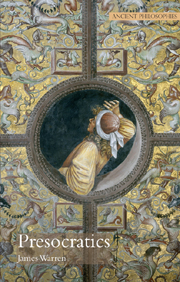Book contents
- Frontmatter
- Contents
- Acknowledgements
- Sources and abbreviations
- Chronology
- Map of the ancient Mediterranean
- 1 Introduction: reading Presocratic philosophy
- 2 Ionian beginnings
- 3 Xenophanes
- 4 The oracles of Heraclitus
- 5 Parmenides
- 6 Reactions to Parmenides
- 7 Anaxagoras
- 8 Empedocles
- 9 Democritus and Leucippus
- 10 Epilogue
- Guide to further reading
- Notes
- Bibliography
- Index of passages
- Index
9 - Democritus and Leucippus
- Frontmatter
- Contents
- Acknowledgements
- Sources and abbreviations
- Chronology
- Map of the ancient Mediterranean
- 1 Introduction: reading Presocratic philosophy
- 2 Ionian beginnings
- 3 Xenophanes
- 4 The oracles of Heraclitus
- 5 Parmenides
- 6 Reactions to Parmenides
- 7 Anaxagoras
- 8 Empedocles
- 9 Democritus and Leucippus
- 10 Epilogue
- Guide to further reading
- Notes
- Bibliography
- Index of passages
- Index
Summary
Abdera, a town on the North coast of the Aegean, was not known for the intelligence of its inhabitants. The late antique joke-book the Philogelos (“Laughter-lover”) contains a number of jokes aimed at this stereotype. For example: “Did you hear the one about the Abderan who heard that onions cause wind? He strapped a bunch to the back of his boat, thinking it would make it go faster!” But despite this reputation, the city was home not only to the great Sophist Protagoras, but also to two other important philosophers: Leucippus and Democritus.
These two are most famous for their description of an atomist cosmology. According to them, the universe is a limitless expanse containing two kinds of thing: the void (empty space) and atoms (everlasting and indivisible bits of matter). As the countless atoms move in the void they come together and disperse to create various worlds and all the things in them. We know next to nothing about Leucippus, and it is very difficult to determine which elements of the atomist cosmology we should assign to him or to Democritus. In fact, Leucippus' achievements seem to have been so overshadowed by Democritus that Epicurus, the Hellenistic atomist, even denied that there ever had been a philosopher by that name. We know a bit more about Democritus. His dates are disputed and there are various competing ancient reports, but we can be confident that he outlived Socrates, perhaps by up to fifty years.
- Type
- Chapter
- Information
- Presocratics , pp. 153 - 174Publisher: Acumen PublishingPrint publication year: 2007



